Former PM supports Lord Darzi report findings during Imperial visit
by Ryan O'Hare

Former Prime Minister Tony Blair voiced support for Lord Darzi’s calls to reform the NHS during a visit to Imperial last week.
The former Prime Minister made the comments during an event to present the final Lord Darzi Review of Health and Care, which sets out a number of key reforms needed to maintain the NHS for the coming decade and beyond.
Speaking on a panel during the event, Mr Blair said: “The challenge for the NHS is to stay true to its principles but be under a constant state of change and modernization.”
The report, authored by Professor the Lord Darzi of Denham and published last month, called for a raft of changes including the ‘radical simplification’ of the structure of the NHS and free social care at the point of need, as well as setting out a proposed settlement for long-term funding.

Presenting the key findings, Lord Darzi, Director of the Institute of Global Health Innovation at Imperial, told policymakers, academics and NHS staff of the need to change the mindset around the NHS “from one of a sickness service to a health and wellbeing service”.
He explained that since the last major review of the health service in 2008 “overall quality of care has improved, but access to care has been significantly compromised”.
Among the highlights from the final report, Lord Darzi touched on the critical need to improve access to social care and to strengthen public health policy, as well as the need for the health service to invest in new and innovative technologies.

During a panel session, Mr Blair spoke of the need to be “a lot tougher on public health”.
“You have got to give people that sense that if the NHS is going to be invested in and changed in this way, it's part of a contract between citizens and government and there's an individual responsibility as well,” he said.
Mr Blair echoed the comments from Lord Darzi around the importance of an improved funding settlement for the NHS, he said: “I think it is possible to get a cross party national consensus behind a new plan for the health service [and] I think it has to be done, because otherwise we'll find we're doing bits of change here and there, but they don't add up to a...comprehensive plan.”
The role for technology
Addressing the report’s calls for increased investment in cutting edge technologies, Professor Nick Jennings, Vice-Provost (Research and Enterprise) at Imperial, focused on artificial intelligence (AI), highlighting screening and decision-making as two key areas where it could have most benefit.
“We want automation to support the humans who are making the decisions,” explained Professor Jennings.
“It's a decision-making aid, it's not a replacement for people. It's the partnership between humans and AI working together that is really the strength and where we will make significant advances in this area.”

Responding to the proposed funding settlement set out in Lord Darzi’s report, Dame Ruth Carnall, former chief executive of NHS London, explained that the NHS needs to “rise to the challenge” and that any change will require “the ability to set and stick to clear priorities”.
She said: “This means some people are not going to get what they want, some people are going to be told that they must wait, but focus on the priorities that will have the greatest impact on the things that the population needs.
Mr Blair added: “I think it is going to be important that we do that in a way that explains to the public what is possible and what is not and on what timescale, and explains to those working within the health service that if you are going to have this new settlement around funding it doesn't just mean things stay as they are and can carry on in the same way.

“That is the sentiment around this, [it] has got to be a process where at same time as we are securing both the principle and financial support for the health service we're embracing change.”
The event took place at Imperial College Business School which includes the Centre for Health Economics & Policy Innovation (CHEPI) which brings together economists and public health experts. The event was introduced by Dean of the School, Professor Francisco Veloso.
During his visit to Imperial Mr Blair also toured the Hamlyn Centre, viewing demonstrations of the first generation Da Vinci surgical robots, 3D printed microrobotic tools as well as augmented reality in medical imaging.
Mr Blair's team also spoke to members at the IGHI's Centre for Health Policy about the impact of their research, which uses big data to understand complex health systems such as the NHS.
Article text (excluding photos or graphics) © Imperial College London.
Photos and graphics subject to third party copyright used with permission or © Imperial College London.
Reporter
Ryan O'Hare
Communications Division